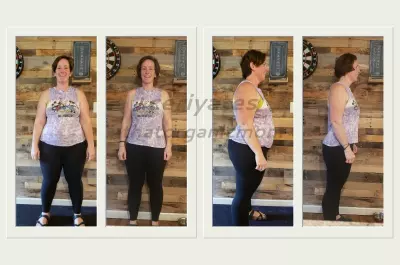Podcast: Play in new window | Download
Subscribe: Apple Podcasts | RSS
Last Updated on September 20, 2022 by Rebecca Huff
Ceri Yates shares how she tried and then ditched the toxic diet culture before finding her own way to successful, sustainable weight loss. You'll love her story in this episode of A Healthy Bite. (The podcast player is located at the bottom of this post; you can also listen on iTunes or Spotify!)
Ceri shares a glimpse of what it was like to dip her toes into a multi-level marketing weight loss company after seeing a friend’s post on social media. However, she quickly realized it was more about sales and making money than her health. The MLM, it seemed, was also part of the toxic diet culture of which she wanted no part.
Body Positivity
To begin with, Ceri was comfortable with accepting her own body; however, she wanted the stamina and energy to keep up with her loved ones. She also wanted to avoid some of the health issues that had been plaguing her for years when she ate dairy and wheat.

Because Ceri was focused on wellness for herself and her family, she prepared meals at home with organic vegetables and even grew some of her own food in her backyard garden.
Ceri shares the four things she believes helped her improve her physical health by reducing her body weight. Her weight loss eliminated the stress that had been put on her feet and allowed her to experience a heightened sense of well-being.
Ceri doesn’t buy into diet fads or fat-shaming; not before nor after her weight loss. She simply felt the pain that many of us do when walking around in larger bodies.
In spite of some already good eating habits, Ceri still struggled with weight gain. She believed she was already making some good choices and continued those when she implemented her new diet.
- Sleeping 7-8 hours each night.
- Moving her body. Ceri enjoys hiking and stays active with her kids.
- Getting out in the sunshine.
- Avoiding sugar, dairy, and gluten because they are inflammatory and cause her skin to flare up, as well as other symptoms that indicated she had an intolerance.
The Modifications Ceri made to her already healthy food choices
- Mental Shift – Ceri says she quit making excuses and that was the most important thing for her.
- Anchor Meals in Protein – ”Protein is an essential component of a healthy diet and is a focus of research programs seeking to optimize health at all stages of life. The focus on protein as a nutrient often centers on its thermogenic and satiating effect, and when included as part of a healthy diet, its potential to preserve lean body mass.” 1
- Drink Water – Staying hydrated and reaching for water instead of beverages with calories, especially alcohol. Ceri is a fan of beer and still drinks the occasional craft beer, however, she drastically reduced her alcohol intake.
- Eat within the first hour of waking – Choose a high-quality shake or another easy protein source then continue to eat protein-forward meals when hungry.
Why The Diet Culture is Toxic
Food rules that are restrictive may lead to binge eating and other harmful behaviors.
Toxic Diet culture may trigger overwhelming feelings of shame, guilt, embarrassment, and fear. Meanwhile, it glorifies weight loss and dieting to the point that you may feel like a failure if you can’t adhere to its strict rules.
What do you consider diet culture?
The National Eating Disorders Association Health suggests that diet culture is a set of beliefs encouraging views that being skinny is ideal and that fat is bad. Health at Every Size (HAES) challenges the value of promoting weight loss and dieting behavior and argues for a shift in focus to weight-neutral outcomes. 2
The toxic diet culture can have a negative impact on self-esteem. In some cases, it can lead to disordered eating or eating disorders.
Disordered eating may include a heightened focus on appearance, insecurities surrounding the number on the scale, and skipping meals. Bulimia and anorexia are eating disorders.
Some examples of toxic diet culture include:
- following a restrictive diet with the goal of losing weight
- eliminating an entire food group for weight loss purposes
- obsessive calorie counting
- feeling guilty for eating
- over-exercising to burn calories
- feeling that you need to look a certain way to be accepted in society
- extreme long-term restriction of food groups
- fat-shaming
- taking laxatives or other quick-fix weight loss aids
Finding the balance with intuitive eating
Does diet culture make you feel like you have to be thin? Absolutely.
Diet culture glorifies thinness and exacerbates fatphobia. Healthcare providers may even participate in toxic diet culture by infusing weight stigma into medical care. So, rather than getting the evidence-based intervention that a thin person with the same health condition would get, obese people get diet recommendations.
Research shows many of these recommendations are unlikely to lead to sustainable weight loss. Yes, many doctors, dietitians, and nutritionists discriminate against people with obesity. Unfortunately, the medical industry is rife with toxic diet culture practices.
The best diet cannot be found in the type of yo-yo dieting many of us are used to seeing with drastic results. Although a lot of people, influencers included, follow these restrictive diets, they may not show the negative health outcomes that come as a result.
As I mentioned in a previous post about what causes weight gain, I believe the best way to eliminate toxic diet culture is to stop “diet talk” altogether. You can experience intentional weight loss with non-diet methods.
In fact, these non-diet methods include eating for health, not for weight loss. This is part of common sense self-care; walking daily, other types of movement, eating plenty of vegetables and leafy greens, drinking the appropriate amount of water.
Monitoring BMI or other markers with the help of your health care provider.
Anti-Diet
You want to be the healthiest version of yourself that you can be no matter what body size. Finding the balance means good mental health and a positive body image. We are all unique in our body types but the diet industry would like us to believe that is untrue.
Carbs are not the enemy and keto isn’t for everyone. Food doesn’t fix everything; whether you are adding or subtracting, food intake isn’t the only issue when it comes to changing our eating habits.
If you’re self-medicating with food, it’s your lifestyle that needs changing, not your diet. Practice self-love by learning to cope with emotions without using food.
If, like Ceri, you choose to work on your relationship with food and get real about what is causing you to be unhappy with your body size, seek a registered dietitian who will help you get to the root of your unique challenge. It may not have anything to do with food at all.
Ceri's Tips
- Mental Shift is most important
- Anchor every meal in protein
- Eat within the first hour of waking
- Drink enough water for your body
- Practice good sleep hygiene until you're getting around 8 hours of sleep per night
- Move your body daily
- Avoid food triggers and allergens (these tend to be different based on individual needs


 Baked Spinach Artichoke Dip
Baked Spinach Artichoke Dip